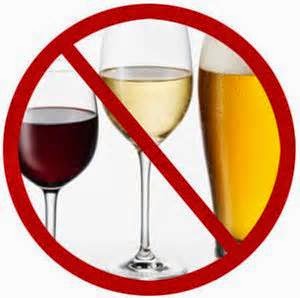Alcohol in Moderation
It’s Lent and many are in the
grip of dreary abstinence from the pleasures of alcohol, which will leave them
depressed and cross. According to Julia Stephenson in the Telegraph, drink has
been demonised. Yet we forget that some of the greatest music, art, ideas and
collaborations in history and in our time have been created while enjoying a
good drink. In moderate amounts, it lifts the spirits and lightens life.
Everyone looks better, everyone seems funnier. Is there so much wrong with
that?
Of course, overindulgence is
harmful. But to show only one side of the picture, as government and medical
authorities inevitably do, is simply bad medicine. It prevents people making
sensible decisions about their own health. Prof Karol Sikora, a UK-based consultant
oncologist, sticks up for moderate drinking. Too much booze, he warns, not only
kills but “ruins lives, destroys families, ends successful careers, causes
untold physical and mental illness and has a huge adverse impact on society”.
However, he continues: “If you don’t drink at all, you have a defined risk of
developing all sorts of medical problems in your heart, joints, brain, blood
sugar levels and kidneys — indeed all round your body.” According to The Good
News About Booze, a well-researched book by science journalist Tony Edwards,
all alcohol in moderation benefits health. He writes: “Most of the evidence
suggests that if red wine, in particular – and to a lesser degree white wine,
beer, lager and spirits – were used as a preventive and therapeutic medicine,
disease rates would fall substantially. Not only that, but lives would be saved
– with huge benefits to the economy. In fact, red wine may well be one of the
most effective 'medications’ in history.”
Should we take a day or two off a
week to give our livers a rest? What are the benefits of moderate drinking? (i.e. Moderate, here, means
following Government guidelines: men should not regularly exceed 3-4 units per
day and women should not regularly exceed 2-3 units)
- The risk of dying in any given year is 25 per cent lower
- The risk of morbidity and mortality from coronary heart disease is 40-60 per cent lower.
- The risk of a heart attack for moderate drinkers with diabetes is 52 per cent lower than among non‑drinkers.
- The risk of dying in the four years after a heart attack is 32 per cent lower among those who were moderate drinkers in the year before the attack.
- More than 30-40 per cent less likely to develop diabetes.
- A 54 per cent lower chance of developing dementia than abstainers.
- Moderate drinking reduces the risk of stroke by about one-half.
- Women who drink in moderation have a 15 per cent lower chance of developing high blood pressure than teetotallers.
- Men who drink in moderation tend to live about two years longer than abstainers.
- Alcohol has social and psychological benefits. A drink before a meal can improve digestion or offer a soothing respite at the end of a stressful day. The occasional drink with friends can be a social tonic.





Comments
Post a Comment